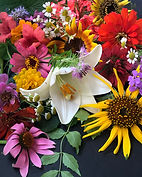
Prentiss Clark (website in progress....)
Associate Professor, Department of English, University of South Dakota


Provocations (in progress)
“There is confession in the glances of our eyes; in our smiles; in salutations; and the grasp of hands.” –Ralph Waldo Emerson, “Spiritual Laws” “Every gesture any human being makes is loaded, is a confession, is a revelation: nothing can be hidden, but there is so much that we do not want to see, do not dare to see.” –James Baldwin, Just Above My Head
“Truly speaking, it is not instruction, but provocation, that I can receive from another soul”
—Ralph Waldo Emerson,
Divinity School Address (CW I: 80)
"Literary criticism should arise out of a debt of love." --George Steiner
“…this element in which we habitually move…who will ever paint that? Who will ever tell that story? The physical history of the earth, its psychology. All of us, to a greater or lesser degree, all things animate and inanimate, are a bit of solar heat that has been stored up and organized, a reminder of the sun, a little phosphorous burning in the membranes of the earth’s brain.” --Paul Cezanne
“Poets, prophets and reformers are all picture makers – and this ability is the secret of their power and of their achievements. They see what ought to be by the reflection of what is, and endeavor to remove the contradiction.” —Frederick Douglass, “Lecture on Pictures”
“Let us then examine anew the basic thesis of democracy. It does not really mean to say that all men are equal; but it does assert that every individual who is a part of the state must have his experience and his necessities regarded by that state if the state survive; that the best and only ultimate authority on an individual’s hurt and desire is that individual himself no matter how inarticulate his inner soul may be; that life, as any man has lived it, is part of that great national reservoir of knowledge without use of which no government can do justice.” -- W.E.B. Du Bois, “The Revelation of Saint Orgne the Damned”
"Feeling at its deepest — as we all have reason to know — tends to be inarticulate." --Marianne Moore
“The reading of a poem, a poetry reading, is not a spectacle, nor can it be passively received. It’s an exchange of electrical currents through language— that daily, mundane, abused, and ill-prized medium, that instrument of deception and revelation, that material thing, that knife, rag, boat, spoon/reed become pipe/tree trunk become drum/mud become clay flute/conch shell become summons to freedom/old trousers and petticoats become iconography in appliqué/rubber bands stretched around a box become lyre.”
“Only one thing remained reachable, close and secure amid all loses: language. Yes, language. In spite of everything, it remained secure against loss. But it had to go through its own lack of answers, through terrifying silence, through the thousand darknesses of murderous speech. It went through.” —Paul Celan, Bremen Prize acceptance speech
"The deed goes where the word fails, and life enchants where rhetoric cannnot persuade." --Theodore Parker
“I call ‘poet’ any writing being who sets out on this path [around the world], in quest of what I call the second innocence, the one that comes after knowing, the one that no longer knows, the one that knows how not to know. I call ‘poet’ any writer, philosopher, author of plays, dreamer, producer of dreams, who uses life as a time of ‘approaching.'" -Hélène Cixous, “The Last Painting or the Portrait of God"
"[The scholar] is to take his run in the past to acquire the momentum of history, his stand in the present, and leap into the future." --Theodore Parker
"And one trembles to be so understood and, at last, To understand, as if to know became The fatality of seeing thins too well" —Wallace Stevens, "Notes Toward a Supreme Fiction"
"The sea speaks the same language around the world's shores." Derek Walcott
"There are times in life when the question of knowing if one can think differntly than one thinks, and perceieve differently than one sees, is absolutely necessary if one is to go on looking and reflecting at all." -Michel Foucault
"When historical visibility has faded, when the present tense of testimony loses its power to arrest, then the displacements memory and the indirections of art offer us the image of our psychic survival. To live in the unhomely world, to find its ambivalencies and ambiguities in the house of fiction, or its sundering and splitting performed in the work of art, is also to affirm a profound desire for social solidarity." --Homi Bhabha
"Human forms of feeling, objects of human attention, our reactions constituted in art, are as universal and necessary, as revelatory of the world, as the forms of the laws of physics. This is the writer's faith..." Stanley Cavell, The Senses of Walden